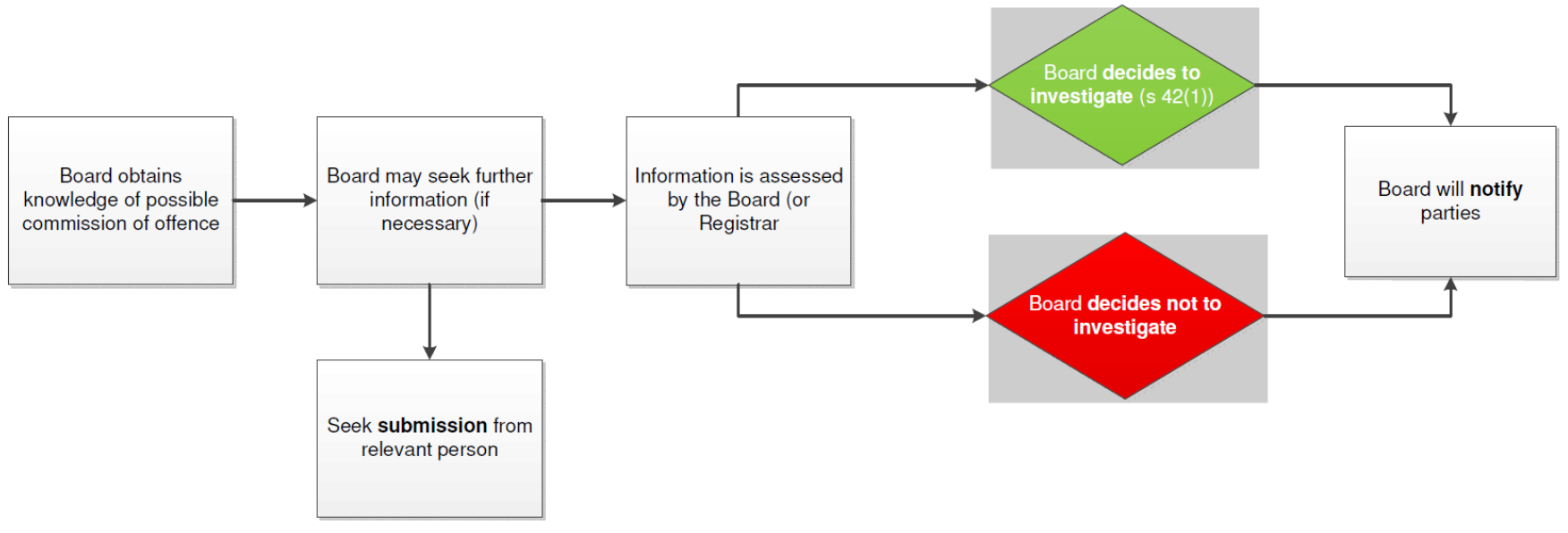16 Jul Offences and Investigation Decisions Policy
POLICY ID 2.2 (5A)
Effective: 2 August 2017
Purpose
The purpose of this policy is to set out the offences under the Professional Engineers Act 2002 (Qld) (Act) and provide guidance to the Board, RPEQs and the public as to how the Board will make a decision to investigate, or not to investigate, suspected offences against the Act.
This Policy:
- sets out the offences established by the Act; and
- provides guidance to the Board, RPEQs and the public as to how the Board will make a decision to investigate, or not to investigate, suspected offences against the Act.
Authority
Section 42 of the Act:
- empowers the Board to make a decision to investigate a person who it reasonably suspects has committed an offence against the Act; and
- allows the Board, to help it decide whether to investigate, to give the person a notice stating the person may make a submission to the Board about the matter the subject of the suspected offence.
Scope
This Policy applies to any decision to be made by the Board to investigate a suspected offence against the Act pursuant to section 42 of the Act.
Overview
The statutory framework in respect of a decision to investigate an offence is illustrated below:

Offences
The Act contains 17 offence provisions across three categories:
| Offence Type | Offence Provisions |
| Registration Offences | Sections 30, 31, 32, 32A, 32B, 32C |
| Investigation Offences | Sections 56(1), 56(2), 65, 66, 67, 68 |
| Other Offences | Sections 113(1), 113(2), 114, 115(1), 115(3) |
The offences against the PE Act are:
| Section | Offence | Maximum Penalty |
| 30 | A person, in relation to an application under Part 2 of the Act (Registration) must not state anything to the Board the person knows is false or misleading in a material particular | 50 penalty units |
| 31 | A person, in relation to an application under Part 2 of the Act (Registration) must not give the Board a document containing information the person knows is false or misleading in a material particular | 50 penalty units |
| 32 | A registered professional engineer must, within 21 days after changing his or her name or contact details, advise the Board about the change unless the engineer has a reasonable excuse | 10 penalty units |
| 32A | A registered professional engineer must advise the Board about any disciplinary action (the event) taken against the engineer in another State or a foreign country in relation to the engineer’s practice as an engineer, within 21 days after the event, unless the engineer has a reasonable excuse. | 50 penalty units |
| 32B | A registered professional engineer must immediately notify the Board in writing if the engineer has been unable to competently and safely practise as a registered professional engineer for a continuous period of 3 months because of the engineer’s mental or physical health unless the engineer has already notified the Board in writing of the incapacity or has a reasonable excuse. | 50 penalty units |
| 32C | If a registered professional engineer receives a warning notice under section 27A of the Act or if the QCAT makes an order imposing a condition on the engineer’s registration under section 131(3)(b), the engineer must return the engineer’s certificate of registration to the Board within 21 days after receiving the warning notice or the QCAT makes the order, unless the engineer has a reasonable excuse. | 50 penalty units |
| 56(1) | A person required to give information to the Board or an investigator under section 55 of the Act must comply with the requirement unless the person has a reasonable excuse. | 50 penalty units |
| 56(2) | A person given a notice under section 55 must not, without reasonable excuse, fail to attend as required by the notice, to continue to attend as required by the Board or investigator until excused from further attendance, to answer a question the person is required to answer by the Board or investigator or to produce a document the person is required to produce by the Notice. | 50 penalty unit |
| 65 | A person must not, in relation to an investigation, state anything to the Board or an investigator that the person knows is false or misleading in a material particular. | 50 penalty units |
| 66 | A person must not, in relation to an investigation, give the Board or an investigator a document containing information that the person knows is false or misleading in a material particular. | 50 penalty units |
| 67 | A person must not obstruct the Board in its exercise of a power in the conduct of an investigation, or an investigator in the exercise of a power, unless the person has a reasonable excuse. | 100 penalty units |
| 68 | A person must not pretend to be an investigator. | 100 penalty units |
| 113(1) | A person must not hold himself or herself out to be a registered professional engineer or allow himself or herself to be held out as a registered professional engineer. | 1000 penalty units |
| 113(2) | A person must not hold out another person as a registered professional engineer if the person knows or ought reasonably to know the other person is not a registered professional engineer. | 1000 penalty units |
| 114 | A person who is not a registered professional engineer must not use the titles ‘registered professional engineer’, ‘registered professional engineer of Queensland’ or ‘RPEQ’ or another title or name, prescribed under a regulation, that in the context in which the title or name is used suggests that the person is a registered professional engineer. | 1000 penalty units |
| 115(1) | A person who is not a practising professional engineer must not carry out professional engineering services. | 1000 penalty units |
| 115(3) | A person who is a practising professional engineer must not carry out professional engineering services in an area of engineering other than an area of engineering for which the person is registered under the Act. | 1000 penalty units |
Policy
Requesting a Submission
A decision to issue a notice seeking a response under section 42(2) of the Act is discretionary.
The Board will generally only send a notice to a person suspected of committing an offence against the Act seeking a submission about the matter the subject of the suspected offence where doing so would assist the Board to decide whether it reasonably suspects the commission of the offence.
If the Board can form a reasonable suspicion that an offence has been committed without seeking a response from the person suspected of committing an offence against the Act, then it may make an investigation decision without seeking a response from the person.
Decision to Investigate
If the Board reasonably suspect an offence has been committed, its power to investigate is invoked.
Ordinarily, where the Board has a reasonable suspicion that an offence was committed, it will investigate the suspected offence unless discretionary factors weigh against doing so.
Those discretionary factors include:
- the age of the alleged offence. There is no point investigating an offence that is time barred from prosecution;
- the nature, seriousness and consequences of the alleged offence;
- the circumstances of the person alleged to have committed an offence against the Act, including his/her health (physical and mental);
- the objects of the Act (with reference to the circumstances under consideration); and
- any other matter brought to the attention of the Board that may bear relevance to the decision.
Where the Board decides to conduct an investigation, it must notify the person suspected of committing the offence as soon as practicable after the decision is made.
Given the time limit for commencement of a prosecution imposed by section 139 of the Act, the Board is unlikely to investigate any suspected offence against the Act after the expiry of two years from the date of commission of the offence.
References
Related legislation:
Professional Engineers Act 2002:
Part 3 – Complaints and Investigations
Part 4 – Reports and Board’s Decisions about Investigations
Part 7 – Other Offence Provisions

 MY ACCOUNT
MY ACCOUNT
